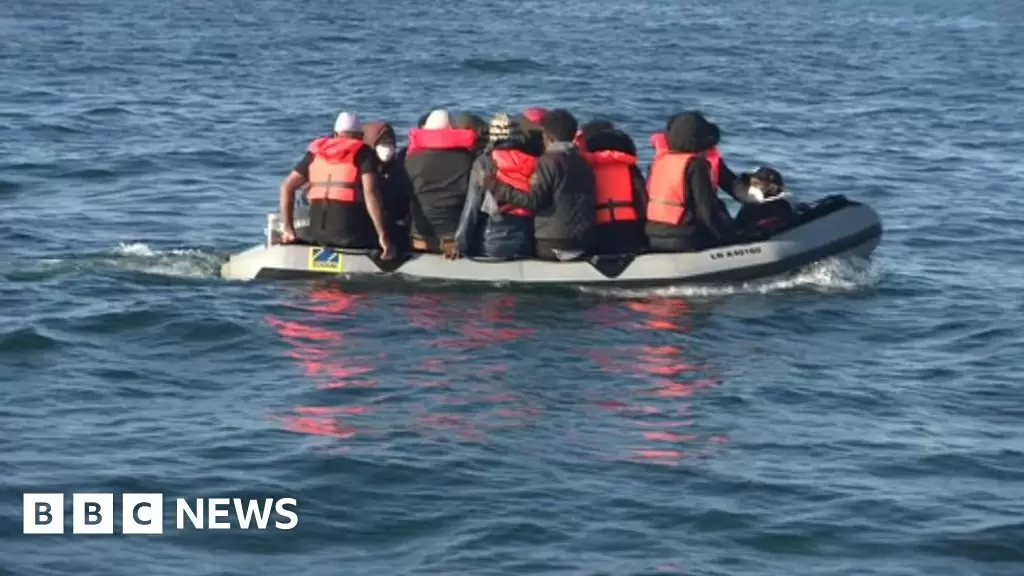Unless you’ve been living under a rock, you will have noticed that the United Kingdom is facing a significant financial challenge in managing the increasing number of small boat crossings across the English Channel, which continue unchecked, despite promises (lies) to the contrary.
The direct costs associated with processing arrivals, housing illegals in hotels, and providing benefits that many UK citizens are denied are placing a substantial strain on public finances. This comes at a time when the UK is grappling with a huge national debt and a bleak economic outlook (thanks, Rachel Reeves), raising critical questions about the long-term affordability (spoiler: It can’t continue) and economic impact of the current situation.
The Direct Costs: A Multi-Billion Pound Blackhole
The financial burden of small boat crossings encompasses a wide range of expenses, from the immediate operational response in the Channel to the long-term costs of supporting the illegals themselves.
The financial resources allocated to managing the asylum process, particularly in response to the increase in small boat arrivals, have grown substantially.
Would you like to see the eyewatering costs of the Government’s illegal migration/invasion non-policy? Here we go…
The costs of the asylum system
Asylum Support, Resettlement, and Accommodation (ASRA): The Home Office’s budget for ASRA has seen a significant increase, reaching £5.422 billion for the 2023/24 fiscal year. This funding is a core component of the response to small boat crossings and represents a 39% increase compared to the previous year’s supplementary estimate. This sharp rise is a direct consequence of the growing number of individuals arriving and requiring support.
Initiatives to Tackle Illegal Migration: The UK government has earmarked considerable funds for specific programs aimed at deterring and managing small boat crossings. A total of £601.3 million has been allocated to a range of measures designed to tackle illegal migration. Furthermore, the implementation of the Illegal Migration Act 2023 has a dedicated budget of £325.8 million. I wonder why illegal crossings have increased, then? Perhaps because these ‘measures’ aren’t worth the napkins they are written on.
Illegal Migration Taskforce: To coordinate and intensify efforts to address the issue, an Illegal Migration Taskforce has been established with a budget of £137.9 million. This Taskforce is designed to bring together various government agencies to enhance the effectiveness of the UK’s response. Did your eyes just roll, or was that thunder?
A Deeper Dive into the UK’s Spending on Small Boat Crossings and the Economic Context
This report provides a more detailed examination of the financial implications of small boat crossings for the United Kingdom, including the costs of the asylum system, accommodation, and support for asylum seekers. It also contextualises this spending within the UK’s current economic climate of high national debt and slow growth.
The High Cost of Accommodation
A huge portion of the expenditure is directed towards providing accommodation for illegals, with hotel use being especially costly, surprising absolutely nobody.
Hotel Expenditure: The cost of housing illegals in hotels has escalated dramatically. In the 2022-23 financial year, the expenditure on hotels was £2.3 billion. This figure is projected to increase to £3.1 billion for the 2023-24 financial year, and the bill for the next period (2025 – 2026) is expected to be £4.3 billion. At its peak in the summer of 2023, the daily cost of using over 400 hotels for this purpose was nearly £9 million.
Alternative Accommodation Costs: In an effort to reduce the reliance on expensive hotels, the government has explored alternative large-scale accommodation sites. However, a report from the National Audit Office (NAO) has indicated that this alternative is now projected to be £46 million more expensive than continuing to use hotels.
Support for Asylum Seekers
After getting off the boat or being picked up before they drown, and after being given massive amounts of help to claim asylum, individuals are entitled to support while their claims are being processed. It is essential to note that this support is for “asylum seekers”, the legal term for those who have formally requested protection, which they are told to do as soon as they encounter someone in a position of authority. Say it with me: “an illegal is an illegal and not a migrant or asylum seeker”. Say it loud enough, maybe enough Herr Starmer will hear… Yeah, right.
Financial Assistance: An illegal (I flat refuse to use the “legal term”, and I urge others to do the same) is generally entitled to £49.18 per week for each person in their household. This is provided on a debit card and is intended to cover essential living costs such as food, clothing, and toiletries. If their accommodation provides meals, this amount is reduced to £9.95 per week.
Accommodation: The government provides accommodation for illegals who would otherwise be destitute. This can be in a flat, house, hostel, or bed and breakfast. Individuals do not get to choose their location and are often housed outside of London and the South East. Yes, you read that right. This means they get priority over British citizens who have been waiting for a home, sometimes for years. Trust me, you don’t despise the left nearly enough.
Other Benefits: Asylum seekers also have access to free NHS healthcare, including prescriptions, dental care, and eye tests. Children between the ages of 5 and 17 are required to attend school, which is free, and may be eligible for free school meals – see the link above.
Economic Implications in an economy already being actively weakened
The significant expenditure on managing small boat crossings and supporting illegal migrants comes at a bad time for the UK economy, and it doesn’t take a genius to figure out why the economy is tanking.
National Debt and Borrowing: The UK’s public sector net debt stood at 97.2% of Gross Domestic Product (GDP) at the end of December 2024, a level not seen since the early 1960s. In the financial year to December 2024, government borrowing reached £129.9 billion. While the costs associated with small boat crossings are a component of this borrowing, they are part of a much larger picture of government spending and failures.
Economic Outlook: The UK economy is navigating a period of slow growth. The International Monetary Fund (IMF) projects growth of around 1.3% in 2025, indicating a fragile recovery rather than a deep recession. However, this snail-paced growth makes any additional significant expenditure, in any area, a big cause for concern, and we should be worried.
Local and Wider Economic Pressures
At a local level, the concentration of asylum seeker accommodation in certain areas puts a strain on local services such as schools and healthcare facilities. Then there is the crime factor, usually violent (that’s a post for another time).
For the wider economy, the billions spent on accommodating and supporting illegal migrants represent funds that are not being invested in other areas of the economy, and plugging the £20 billion blackhole that still hasn’t been proven to exist, although there is almost certainly one now.
In conclusion, the financial costs associated with small boat crossings are substantial and are contributing to the UK’s high levels of government spending and borrowing. While the immediate focus is on managing the arrivals and providing unwarranted support instead of kicking them out, the long-term economic implications remain extremely bleak.
This isn’t something that will be solved overnight, even if Starmer started doing the right thing immediately, as it is tricky and let’s be honest, some of these illegals may have legitimate concerns… Yeah, I don’t buy it either – all I’ve seen on the news is grown adult men.
Whether people like it or not, mass deportations are needed. We also need to find out just where these boats and lifejackets are being handed out and just why the French are doing nothing to find out and stop it (or are they doing it themselves?).






No responses yet